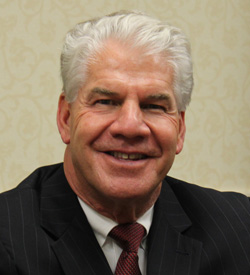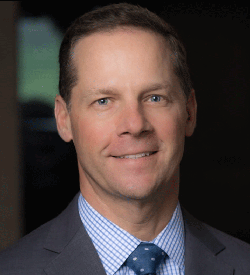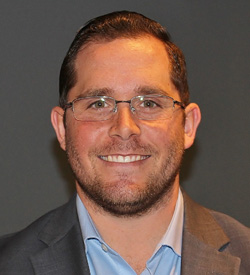YOUNGSTOWN, Ohio – If there’s one upside to the coronavirus pandemic for retirement planners, it’s that the advice they’ve given for years is sound.

“It sounds conservative and boring. But you see time and time again that if you stick with it, it works,” says Mark Wenick, chief wealth management officer for Farmers Trust Co. in Boardman. “As long as you maintain discipline, that plan serves you well.”
When a series of crashes hit stock markets in March – including a 26% drop on the Dow Jones Industrial Average over the course of four trading days – there was plenty of reason to panic. Such crashes are bound to elicit worry, even more so when they are tied to something as unfamiliar as a global pandemic. For retirement planners and financial advisers, part of their job is to help clients to maintain their composure in such events.

“After a quarter century in this business, I’m probably pretty qualified as an armchair psychiatrist at this point,” says Stephen VanSuch, a financial adviser at the Canfield office of Merrill Lynch, with a laugh. “When things get bumpy in the world, with the markets or economy or anything else, I always help them gain a perspective and make sense of what’s really going on so they can maintain their long-term perspective.”
Markets have rebounded and those who kept to their investment plans are, in many cases, better off than if they had backed out of the market in March. For those who were planning on entering retirement in the early days of the pandemic, advisers say that because of how plans are laid out – getting more conservative as retirement dates approach – the impact on new retirees was limited.

“If you were planning to retire this year, you’d be positioned differently then someone like myself who still has 40 years of work ahead of them,” says Patrick Russo, wealth adviser at Daprile Financial, Canfield. “They would probably have plenty of cash to get through the first year of retirement. While some portfolios would fluctuate with the markets, they’re comfortable knowing they have cash to get them through the recovery.”
The advisers all say that while there may have been some moving of assets into less risk-averse avenues, there wasn’t much. It keeps with the strategy of watching the horizon, rather than reacting to daily changes. At W3 Wealth Management in Warren, financial adviser Ryan Glinn says the firm didn’t make any adjustments to clients’ portfolios as a result of the crashes.
“We invest the way we do for a reason, whether that’s to get you retirement income or accomplish the goals you need to hit so that you can retire. The ‘stay the course’ message, this completely proves that it’s a great way to go about it,” he says. “When you look at where we’re at [Dec. 7], the MSCI World Index is up 11%, the S&P is up 14%. … People who stayed invested improved and are better off because of it.”
Over a sufficiently long timeline, stock prices always increase. Plain and simple, staying the course will almost always be the best advice for long-term retirement planning.
“Control the controllables. People can take control of their financial future. There are decisions you can make. Markets and COVID and geopolitical events; we can’t control those,” VanSuch says. “But if you stay the course and maintain perspective while owning the highest quality companies, you can have a plan in place.”

But investments weren’t the only thing affected by the pandemic. Plans for what retirees would spend their money on were also affected, says Sam Morocco. A retirement income certified planner at Gem-Young Insurance & Financial Services in Canfield, Morocco has spent years working with clients to ensure they can live how they want after they retire. Often, that includes planning for things like travel, time with the family and other activities that have been put on hold because of the pandemic.
That doesn’t mean, though, that retirement income is going unspent, he says.
“[Humans] can adapt and we seem to be flexible in changing the activities we want to do. We can fit what our life is like now,” he says. “We’ve had people say, ‘We wanted to go to Europe or the Bahamas or Florida, but now we’re postponing it.’ They found other things that are less costly and keep them within their area.”
The pandemic also helped kickstart some conversations about planning, he continues. With uncertainty rampant for most of 2020, there were few better reasons to begin to plan.
“People take a year to plan a vacation. Take a year or two or three to plan your retirement,” Morocco says. “The sooner you start planning, the better position you’re in to do what you want when you want to do it. You need time to lay the groundwork”
While the most visible aspects of the federal coronavirus relief package passed March 25 were the Paycheck Protection Program and the stimulus checks Americans received, it also included opportunities for qualified individuals to dip into their retirement funds, up to $100,000, to weather the storm. Among the changes made by the Cares Act were the elimination – through the end of 2020 – of the 10% withdrawal tax on retirement plans and the three-year deferral of the 20% tax withholding requirement on early distributions.
“It gave you access to your retirement funds, which you normally wouldn’t have without taking a big penalty. Plus, they extended the opportunity to pay money back over a three-year period,” Farmers’ Wenick says. “On loan provisions, they were loosened a bit and allowed you to divest money where you normally couldn’t. It was good relief and it was needed.”
Heading into 2021, the advisers are primarily keeping an eye on two things: the runoff elections for Georgia’s two Senate seats and the arrival of a vaccine for COVID-19. The balance of the Senate staying in Republican control, they say citing industry analysts, would moderate the policies of the incoming Biden administration.

“They like Biden as president and the stability that comes with that. They like a split government if Republicans hold the Senate with Georgia. They like Biden’s picks that have been made. So far, the markets are fine with what’s happening,” Daprile’s Russo says.
With vaccines expected to begin distribution soon, the retirement planners expect markets to continue their upward trajectory and bring new life to stocks outside the markets that have done well during the pandemic.
“The Nasdaq is up nearly 40% on the year, but we still have four sectors in the S&P 500 that are negative,” W3’s Glinn says, pointing to the energy, real estate, financial and utility sectors. “Those segments that have underperformed, particularly the value side of the market, are going to get a bit of a bump should those come to fruition.”
